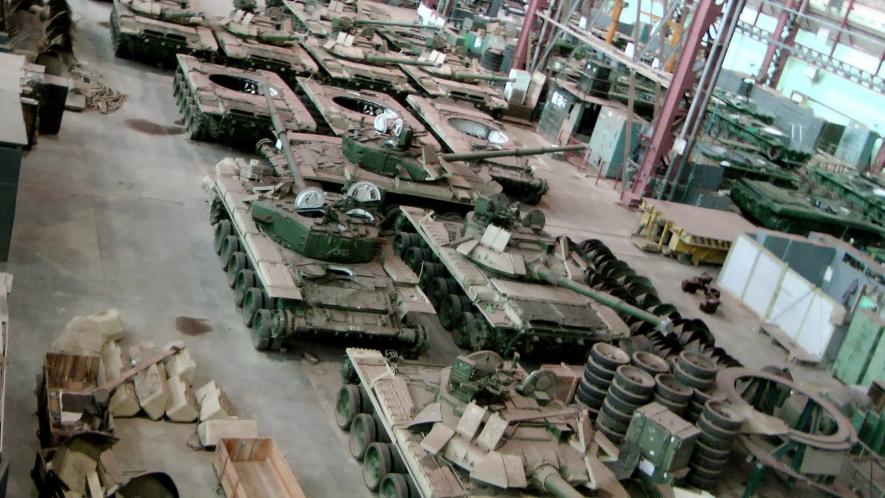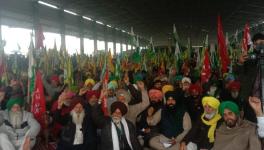Defence Employees Plan Indefinite Strike in Early 2018 to Protest Privatisation

Even as the workers in India are planning for an indefinite general strike with district mobilisations in its run-up set to begin in January 2018, the defence employees are also likely to launch an indefinite strike during early 2018.
A massive protest demonstration is going to be held in New Delhi on 28 December 2017, which will be followed by a week-long strike. If no negotiated settlement with the government emerges at the end of the strike, the defence employees will go on an indefinite strike.
The decision had been announced jointly by the three major defence employees unions - the All India Defence Employees Federation (AIDEF), Indian National Defence Workers Federation (INDWF), and the Bharatiya Pratiraksha Mazdoor Sangh (BPMS) in mid-October. Preparations for the demonstration in Delhi and the indefinite strike are proceeding apace. A declaration to this effect was adopted at a meeting of the three federations on 12 October.
The Struggle Committee of Defence Civilian Employees to Save Defence Industry, a forum consisting of AIDEF, INDWF and BPMS, has written to the Defence Minister Nirmala Sitharaman to inform her about the imminent strike.
The letter says that if the decisions taken by the Ministry of Defence and the Department of Defence Production (DDP) under the Ministry regarding 41 Ordnance Factories, Army Base Workshops under Corps of Electronics and Mechanical Engineers (EME), Depots under Ordnance Services Directorate and Military Farms are implemented, there will be far-reaching consequences. The implications will be most adverse for the 216-year old Ordnance Factories and its employees as well as the other defence establishments.
The Federations represent four lakh defence civilian employees, and yet no discussions or consultations have been held with them regarding such policy decisions, the unions said.
The government's decision to give licenses to 222 private companies for defence manufacturing, and to ease the license policy with 100% FDI being allowed for products including those being manufactured by Ordnance Factories, is ill-advised, said the federations in their joint declaration.
They criticised the DDP's "arbitrary decision" to outsource 143 items being produced by Ordnance Factories, and the decision to stop the production of military vehicles at the Vehicle Factory Jabalpur.
The federations expressed concern at the handing over of small arms production to Punj Lloyd, "whose reputation is under scanner since the company is a loan defaulter of Rs.14,000 crores."
The DDP's directive to the Ordnance Factory Board (OFB) to stop the system of working overtime on Sundays in lieu of holidays to compensate production loss has resulted in the Ordnance Factories failing in their allotted production target "to the tune of Rs. 2250 crores" and in a huge shortfall in the monthly wages of employees.
The unions are opposing the decision to dismantle the various depots under the Directorate General of Ordnance Services and the Army Base Workshops under the Directorate General of the Corps of Electrical & Mechanical Engineers (EME). The whole exercise is being done "arbitrarily with an intention to hand over the EME Workshops to L&T etc," said the federations.
The Army Headquarters / Adjutant General's Branch has said that 31,012 employees are going to be affected or rendered "surplus" as a result of the decisions of the Ministry of Defence.
The decision to close down 39 Military Farms of the Indian Army would result in 1200 permanent employees getting scattered to different places, and 3000 casual workers being thrown out of their jobs.
The DRDO is being asked to hand over technology of the products which can be manufactured in the Ordnance Factories to the private sector, a recent example being the handover of the technology of the Bi-Modular Charge System (BMCS) jointly developed by OFB and DRDO to private firms.
The Ministry of Defence / Army has also decided to import the "K-9 Thunder" Howitzer Gun from South Korea through L&T, even though its reliability has been challenged by the South Korean Army and the media in South Korea after two soldiers were killed in the trial of the gun.
32% of the sanctioned posts of defence civilian employees are lying vacant, while the Military Engineer Services is in serious crisis due to acute shortage of manpower. The DRDO is also being shrunk, with major research projects being handed over to contractors or private agencies.
The federations demanded that the 41 Indian Ordnance Factories be dedicated as national assets and be treated as an integral part of the Armed Forces. The country is maintaining a large contingent of Army, Navy and Air Force for the security of the country, and the Ordnance Factories should be maintained as the fourth Force of the Defence of the country and also in "War Reserve" capacity.
The assurance given by Defence Ministers in the past that "jobs which can be done by Ordnance Factories should not be outsourced and for any new products required for Armed Forces, Ordnance Factories may be given first Priority" should be fulfilled, demanded the defence federations.
The decision of the DDP to designate 143 items of defence production as "Non-Core" should be withdrawn. Any Defence requirement is a core item, and terming a defence product as "Non-Core" is wrong, said the federations. When in the past the Army went in for procurement of such items from outside in the name of "low technology", the result has been inadequate supply and poor quality of the items supplied.
The three Federations said that till a negotiated settlement is reached between the Ministry of Defence and the Federations, the unity forged between them will be preserved. Any decision with regard to agitational programmes will be taken jointly by the three Federations.
AIDEF, INDWF and BPMS have called upon their affiliated Unions to prepare for the agitation, and to constitute Struggle Committees at the area and unit levels for the purpose.
Get the latest reports & analysis with people's perspective on Protests, movements & deep analytical videos, discussions of the current affairs in your Telegram app. Subscribe to NewsClick's Telegram channel & get Real-Time updates on stories, as they get published on our website.
























